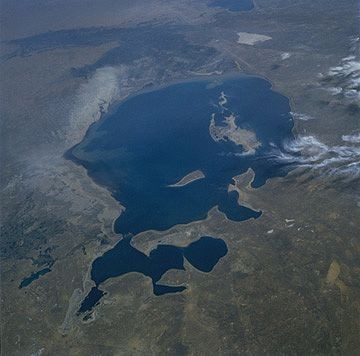TASHKENT (TCA) — Large parts of western Uzbekistan and northern Turkmenistan are recovering from a severe salt storm that has damaged agriculture and livestock herds, RFE/RL’s Uzbek Service reported.
The three-day storm hit Uzbekistan’s Karakalpakstan and Khorezm regions, as well as Turkmenistan’s Dashoguz Province, beginning on May 26.
The salt — lifted from dried-out former parts of the Aral Sea — left a white dust on farmers’ fields and fruit trees that is expected to ruin many crops.
The storm also caused flights at the Urgench airport to be canceled, made driving hazardous, and caused breathing difficulties for many people.
Particularly hard hit by the storm, which reached speeds of more than 20 meters per second, were the Uzbek regions of Khorezm, Navoi, and Bukhara.
Remnants of the storm were also reported as far south as Ashgabat, the capital of Turkmenistan.
Temirbek Bobo, 80, told RFE/RL’s Uzbek Service that it was the first time he had seen such a harsh storm.
“I’ve seen the wind bring sand before, but this was the first time I saw salt. This event can be called a catastrophe,” said Bobo, who lives in the Takhiatash district of Karakalpakstan. “The whole day there was nothing but salt rain [coming down]. The sun was not visible.”
He added: “Nature began to take revenge on us for [what we have done] to the Aral Sea.”
A representative of the Karakalpakstan’s Council of Ministers, who spoke on condition of anonymity, said the council had not received any instructions regarding the situation, but suggested that the region’s Agricultural Ministry may have.
Salt storms are common in areas near the Aral Sea, but this one carried salt over a much wider area.
The Aral Sea once was one of the four largest seas on Earth, but intensive irrigation projects set up by the Soviet Union in the 1960s led to its desiccation.
The runoff from nearby agricultural fields has polluted the remaining parts of the Aral Sea with pesticides and fertilizers, which have crystallized with the salt.
Inhalation of the salt can cause severe throat and lung problems. The salt also can poison farmers’ produce and cause chemical damage to buildings.



